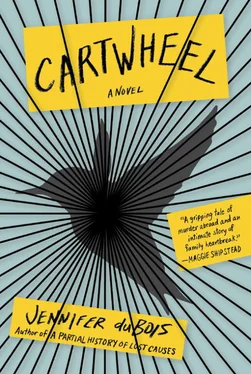“I didn’t want anyone to know I was over here.”
“Well, I don’t see how it’s any of your concern what’s going on with the Carrizos.” Sebastien sounded cross, and he was further cross with himself for caring—privacy was such a bourgeois value, after all. “And I also don’t know why you think I’d know.”
“Of course you know. What else do you do besides sit there and watch everybody all day long? And there’s that thing you said at the dinner.”
“What thing?”
“About whether they were feeding us well. About the lawsuit.”
“That was just a joke.”
“I know Lily thinks that everything you say is a joke, but I don’t think anything you say is really a joke. So—what, the Carrizos are being sued? Why?”
Sebastien rubbed his hair fretfully. “Something untoward with money,” he said. “I think. Why does anybody get sued?”
“How do you know that?”
“I just told you I don’t know that.”
Katy looked at him sharply. “How do you think you know it?”
“It’s gossip and hearsay,” said Sebastien. “Truly mediocre intelligence. Do with it what you will. Which will hopefully be nothing.”
“What could I possibly do with it?”
“I’m sure I don’t know. I haven’t had even a glimmer of imagination since approximately 1996.”
“You’re a strange boy.”
Sebastien only hoped that the blankness on his face communicated the resounding unoriginality of this observation.
“I should be getting back,” said Katy.
“So soon? A pity.”
Katy retreated down the steps. Her beauty was so austere, so forbidding; there was something hard about it, as though she’d been chiseled from some rare mineral—whereas Lily seemed somehow organic, naturally arising.
“Might I ask,” he said, as Katy was walking away, “whether you’re going to tell Lily you came over here?”
“Why? Afraid it’ll give her the wrong impression?” Katy turned her head away from him and kept walking. “Don’t worry. There’s a lot I don’t tell Lily.”
One day while Lily was out walking in San Telmo, a woman with a collapsing face shrieked at her.
The woman came from nowhere. Lily had been listening to her iPod, and all of a sudden the woman was right in front of her, yelling in Spanish too fast and distorted for comprehension. Lily tried to listen and pick out words even as she walked away—faster and faster, though she was careful not to break into a run—but it was useless: Listening to the woman was like listening to somebody talk in a dream, or through aphasia. Lily retreated into a doorway. The woman followed her there, still shouting. Her skin was leathery, and something about her eyes seemed wrong—the ratio of whites to iris was off somehow, maybe. She reached out and Lily fumbled in her pockets for coins. But when she looked down she saw that the woman wasn’t holding her hands out to receive something; instead she was pointing at Lily, her hands like twin claws, and Lily was reduced to saying she did not understand, she was sorry, she was sorry, she did not understand. At this, the woman—seeming somehow satisfied, though Lily could not guess why—turned and dematerialized into an alleyway.
A moment passed, and Lily stepped gingerly into the street. With the woman gone the square was quiet, the sunbeams gathering into little pools on the concrete. A diagonal slash of light in front of Lily was bristling with dust motes, moving in a silent frenzy. Across the square, two young guys were drinking beers at a cervecería; they looked at Lily and laughed, and one of them raised his glass in a toast. Lily suddenly noticed an eggy wetness on her cheek, which, she knew immediately, was spit. That woman’s spit was on her cheek. Lily wiped her face with the sleeve of her sweater—once, twice, many times—and she was halfway back to the Carrizos’, still wiping, before she understood that that part of her face was just going to feel weird for a while.
For the rest of the afternoon, Lily felt the edgy weariness of ambient guilt. This had been coming in waves, between the Borges and the wine—the worrisome knowledge that she was basically on vacation in a country that was basically poor, at least by U.S. standards. She could not figure out how to regard her presence here. Was it good that she was in Buenos Aires, pumping her modest summer savings into the ridiculous exchange rate and coming out wealthy and dropping money into the economy? And trying—you could not deny that she was trying, and certainly she was trying harder than Katy—to learn the language, and make international connections, and foster cross-cultural understanding, and all that? She should be volunteering somewhere, perhaps. She should be suffering somehow. But then that seemed like it might be shallow, too, and maybe even worse, in a way that she had trouble unraveling. The whole study-abroad program had gone to an orphanage for an afternoon of work, and it had been so painfully clear how useless they all were—that small surmountable problems were being made for them to overcome, that tiny doable tasks were being left undone so that they might all line up and do them. And that everything was going more slowly because of all the translating and the extra explaining. That they’d basically made these people’s jobs harder by their presence. That the real favor would have been to stay home. There was a particular kind of uneasiness that came from recognizing the profundity of your own uselessness. It was all so morally exhausting. Lily worried about it, and then forgot to worry about it, and then worried about the fact that she’d forgotten. She recognized this as perhaps the second stage of culture shock, after elation.
Back at the house, Katy wasn’t home, so Lily dug out her international calling card. She wanted to talk to someone about these things, and if that meant talking to a member of her own family, then so be it. Lily tried Maureen first, but she wasn’t home. She could call Anna, she supposed, but she never called Anna. She honestly forgot about Anna sometimes—not the fact of her, of course, nor her role in almost all of Lily’s childhood memories. But sometimes, it was true, the idea that Anna was living her own life at Colby felt less than totally real to Lily. This feeling was compounded by the legendarily ascetic hours Anna kept—going to bed and arising incomprehensibly early, which had always seemed to Lily like a conscious rejection of the world and its inhabitants. Sometimes at Middlebury Lily had woken up at one p.m. in time for her first class and thought of the terrifying fact that Anna had been awake for six and a half hours already, and the even more terrifying fact that this was nearly all Lily knew about her life. The things that Lily did not know about Anna’s life were legion. Most important, perhaps, Lily did not know whether Anna was still a virgin. Worse, she did not expect to be apprised of any developments on that score, when and if they occurred. Lily had told Anna about her own first time, of course, and Anna had seemed both grossed out, which Lily understood, and also uninterested, which Lily did not understand—not only because sex was an objectively interesting subject, but also because Lily found it unfathomable to be repulsed by something and not also fundamentally curious about it. To Lily, those were essentially the same feelings. With Anna, it was not so. When it came to conversations about the really compelling, vulgar, transfixing realities of life, Anna was maddeningly equanimous; neither overtly interested, nor so prudishly avoidant as to acknowledge those subjects’ power. She would talk about such matters when it was necessary, and what she would say about them then was inevitably practical. When Lily had told her about losing her virginity, for example, Anna had immediately asked if Lily was going to get on birth control.
Читать дальше












